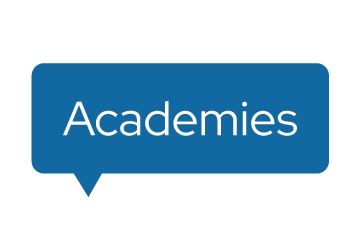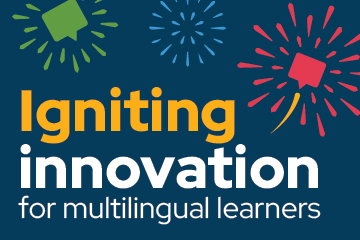This WIDA Snapshot introduces classroom action research – when researchers and educators work together to address classroom challenges – by encouraging teachers to use their researcher voices to make meaningful contributions to the field, whether through collaborative or independent approaches.
 Action research can trace its roots to the 1940s, through the work of Kurt Lewin, a U.S. psychologist who is known as the founder of social psychology and who focused on action and applied research. His writings highlight how researchers and practitioners can come together to address classroom challenges. (For the purposes of this discussion, the term practitioners describes teachers who engage in research to provide insights and perspectives on their practice in the classroom [Miller, Cunha & Allright, 2021].)
Action research can trace its roots to the 1940s, through the work of Kurt Lewin, a U.S. psychologist who is known as the founder of social psychology and who focused on action and applied research. His writings highlight how researchers and practitioners can come together to address classroom challenges. (For the purposes of this discussion, the term practitioners describes teachers who engage in research to provide insights and perspectives on their practice in the classroom [Miller, Cunha & Allright, 2021].)
Action research is dynamic and participatory and has become a cornerstone of education research. It enables teachers understanding, analysis, and reflection to address classroom challenges, while building comprehensive and robust classroom teaching practices at the same time.
For example, scholars continually work with teachers on research initiatives that inform educational theoretical approaches. Beyond this, however, there is something inherently important about giving practitioners a voice in education research (Alrichter, 1993) and especially in language learning (Edwards & Burns, 2015).
What does action research look like for teachers who work with multilingual learners? Embracing multilingualism in the classroom requires awareness and understanding of students’ cross-cultural, social, cognitive, and economic benefits (Martinez, 2018). It also relies on practitioners making informed, evidence-based decisions to influence education for multilingual language development. The voices of practitioners are key to the development of education methods; hence scholars have provided multiple avenues to engage teachers in action research (Sagor, 2000; Burns, 2009).
WIDA’s work in language development has always focused on impact at the classroom level. To this end, practitioners can lay important groundwork to identify and implement strategies that are evidence-based. These practices also include systematically collecting and analyzing data and introducing practices to let teachers as practitioners engage in reflective processes. Letting practitioners gain insights on their work effectiveness and make the needed changes and adaptations is a win-win approach. Through its Marco DALE, Marco ALE and ELD Standards Framework, WIDA is offering not only resources that meet the diverse needs of bilingual learners in the classroom, but also themes that can be explored through action research. The results can then be used to inform changes and updates to instruction.
By pairing frameworks and classroom realities with action research, teachers can promote a student- and learning-centered approach, where we can directly address distinct types of challenges, including language barriers, various levels of language proficiency, diverse cultural backgrounds, and the task of building a more inclusive language learning experience. By providing a nuanced understanding of language development, we can empower our teachers to explore the complexities of language and spark curiosity related to concepts like translanguaging, transculturalism, multiliteracies, equity, and interaction into the curriculum to provide the needed learning supports.
A concrete example of action research has been my experience mentoring teachers in Croatia and Algeria, where we experimented with integrating technology (AI) and differentiated instruction to help us make decisions on levels of engagement, increasing motivation, making learning relatable and building a professional development approach through research to support teachers and learners. The framework we developed builds on achieving evidence-based, and culturally responsive teaching practices that are essential for shaping the new citizens of the world.
As a practitioner and now dedicated to research, I have seen the benefits that action research can have on simple things, including giving instructions, promoting engagement, and developing reflective practices among learners. Because of my background and 30-year career in education, I have seen firsthand how action research stands as a transformative tool for educators building empowerment and bridging theory and practice from those who know best: the teachers.
Action Research Plan
Want to get started? Keep in mind these ideas:
- Action research is not a linear process
- Focus on one specific classroom issue at a time
- Develop a research question (or questions)
- It helps to read the literature, talk to experts, or listen to others discuss the topic
- Plan how to collect and analyze data
- Create a potential roadmap and reflect on it frequently
- Evaluate and readjust as necessary
- Build a network of peer action researchers within your school or district
Remember: you will not only be contributing to addressing challenges in your classroom, but your work is a contribution to the field of language development and education in general.
About the Author
As researcher for WIDA Español, Grazzia Maria Mendoza facilitates research processes and the design of professional development resources through innovation, contextualization during implementation, and the promotion of complex, consistent and quality research.
References
Altrichter, H. (1993). The concept of quality in action research: Giving practitioners a voice in educational research. Qualitative Voices in Educational Research. Routledge.
Burns, A (2009). Doing Action Research in Language Teaching. Routledge. https://doi.org/10.4324/9780203863466
Edwards, E. & Burns, A. (2015). Language teacher action research: achieving sustainability. ELT Journal, 70(1), 6-15 https://doi.org/10.1093/elt/ccv060
Lewin, K. (1946). Action research and minority problems. Journal of Social Issues, 2(4), 34-46 https://doi.org/10.1111/j.1540-4560.1946.tb02295.x
Martínez, R. A. (2018). Beyond the English learner label: Recognizing the richness of bi/multilingual students’ linguistic repertoires. The Reading Teacher, 71(5), 515-522. https://doi.org/10.1002/trtr.1679
Miller, I. K., Cunha, M. I. A., & Allwright, D. (2021). Teachers as practitioners of learning: the lens of exploratory practice. Educational Action Research, 29(3), 447–461. https://doi.org/10.1080/09650792.2020.1842780
Sagor, R. (2000). Guiding school improvement with action research. ASCD.





